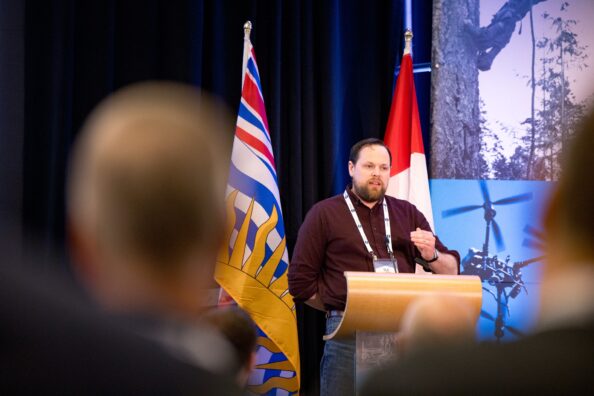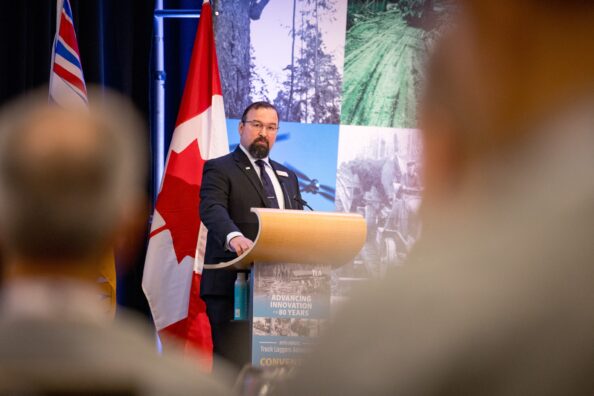 At the Truck Loggers Association (TLA) Conference, the panel titled Securing the Future for BC’s Forestry Contractors brought together industry leaders to address the unique challenges faced by contractors in a rapidly changing forestry landscape. Moderated by Vaughn Palmer, the session featured Bob Brash, Executive Director of the TLA, stepping in for Michael Armstrong of the British Columbia Council of Forest Industries (COFI), along with Chris Duncan, Partner and National Leader of Forestry and Forest Products Services at MNP LLP, and Dorian Uzzell, TLA President and owner of Wahkash Contracting.
At the Truck Loggers Association (TLA) Conference, the panel titled Securing the Future for BC’s Forestry Contractors brought together industry leaders to address the unique challenges faced by contractors in a rapidly changing forestry landscape. Moderated by Vaughn Palmer, the session featured Bob Brash, Executive Director of the TLA, stepping in for Michael Armstrong of the British Columbia Council of Forest Industries (COFI), along with Chris Duncan, Partner and National Leader of Forestry and Forest Products Services at MNP LLP, and Dorian Uzzell, TLA President and owner of Wahkash Contracting.
Standing in for Michael Armstrong, Bob Brash presented an overview of the current state of BC’s forestry sector, utilizing Armstrong’s prepared slides to frame the discussion. Brash emphasized the pressures of declining allowable annual cuts (AAC) and increasing operational costs. Using Armstrong’s slides, he focused on the need for contractors to have greater representation in discussions shaping policy, especially as these pressures continue to mount. Brash discussed how reduced AAC levels significantly impact contractors and communities reliant on forestry jobs. He highlighted that simplified permitting processes and clearer guidelines could offer contractors much-needed support. Brash stressed the importance of advocacy, noting that if contractors don’t actively participate in shaping their narrative, others might misrepresent their contributions. He also called for greater collaboration between contractors, licensees, and government to create policies that reflect practical realities. Brash urged the sector to remain united in presenting a clear and cohesive vision for the future.
 Chris Duncan presented insights from a recent project aimed at creating a standardized framework for contractors to negotiate rates with licensees. This framework, he argued, would help establish fair compensation while fostering transparency and trust between parties. Duncan explained that financial instability among contractors poses risks not only to their operations but also to the broader forestry sector, underscoring the importance of addressing these challenges collaboratively. Duncan’s analysis focused on financial challenges and strategies for fostering collaboration between contractors and licensees. He noted the importance of fair negotiation practices and shared examples of how transparency in agreements could improve contractor stability and trust within the sector.
Chris Duncan presented insights from a recent project aimed at creating a standardized framework for contractors to negotiate rates with licensees. This framework, he argued, would help establish fair compensation while fostering transparency and trust between parties. Duncan explained that financial instability among contractors poses risks not only to their operations but also to the broader forestry sector, underscoring the importance of addressing these challenges collaboratively. Duncan’s analysis focused on financial challenges and strategies for fostering collaboration between contractors and licensees. He noted the importance of fair negotiation practices and shared examples of how transparency in agreements could improve contractor stability and trust within the sector.
 As the TLA President and an active contractor, Dorian Uzzell brought firsthand insights into the day-to-day realities of operating in BC’s forestry sector. He spoke about the operational difficulties posed by reduced timber availability, increased regulatory oversight, and growing financial constraints. Uzzell described the operational challenges contractors face, particularly the combination of reduced timber availability and rising costs. He stressed the importance of policies that better address these realities and provide meaningful support for contractors. He emphasized the need for contractors to have a stronger presence in policy discussions, noting that their expertise is often overlooked in decision-making processes. Uzzell also stressed the importance of workforce development, highlighting the challenges of attracting and retaining skilled labor. “If we don’t invest in people now, we’ll pay for it later. Contractors are the backbone of this industry, and we need to secure their future,” he stated. In addition to workforce development, Uzzell underscored the value of partnerships with Indigenous communities as a model for sustainable collaboration. He emphasized how these collaborations can align forestry goals with environmental and community benefits. Uzzell also called for more targeted apprenticeship programs and incentives to build the next generation of skilled workers. “We need to create pathways for young people to see forestry as a viable and rewarding career,” he said, pointing to the role of government and industry in fostering these initiatives.
As the TLA President and an active contractor, Dorian Uzzell brought firsthand insights into the day-to-day realities of operating in BC’s forestry sector. He spoke about the operational difficulties posed by reduced timber availability, increased regulatory oversight, and growing financial constraints. Uzzell described the operational challenges contractors face, particularly the combination of reduced timber availability and rising costs. He stressed the importance of policies that better address these realities and provide meaningful support for contractors. He emphasized the need for contractors to have a stronger presence in policy discussions, noting that their expertise is often overlooked in decision-making processes. Uzzell also stressed the importance of workforce development, highlighting the challenges of attracting and retaining skilled labor. “If we don’t invest in people now, we’ll pay for it later. Contractors are the backbone of this industry, and we need to secure their future,” he stated. In addition to workforce development, Uzzell underscored the value of partnerships with Indigenous communities as a model for sustainable collaboration. He emphasized how these collaborations can align forestry goals with environmental and community benefits. Uzzell also called for more targeted apprenticeship programs and incentives to build the next generation of skilled workers. “We need to create pathways for young people to see forestry as a viable and rewarding career,” he said, pointing to the role of government and industry in fostering these initiatives.
Drafted with the assistance of digital tools to streamline the process.